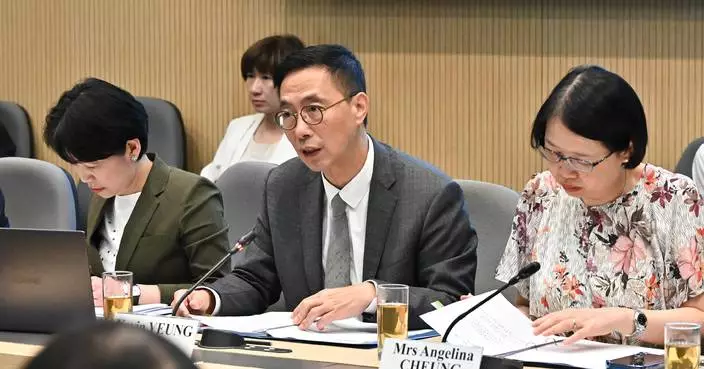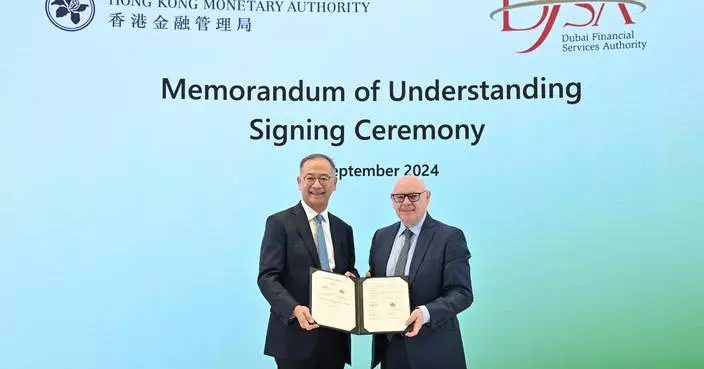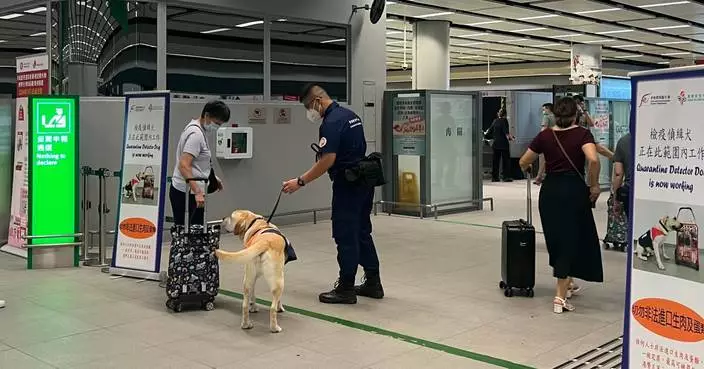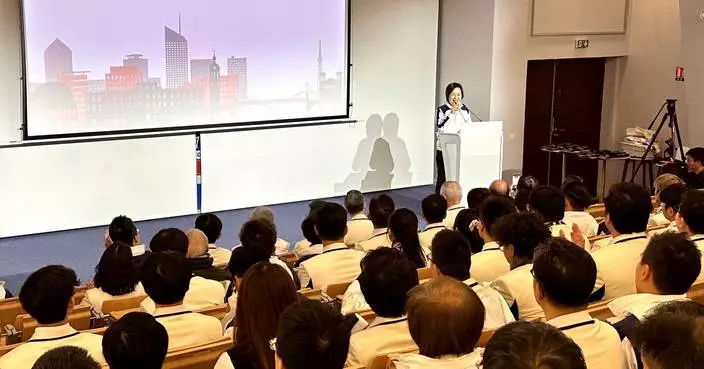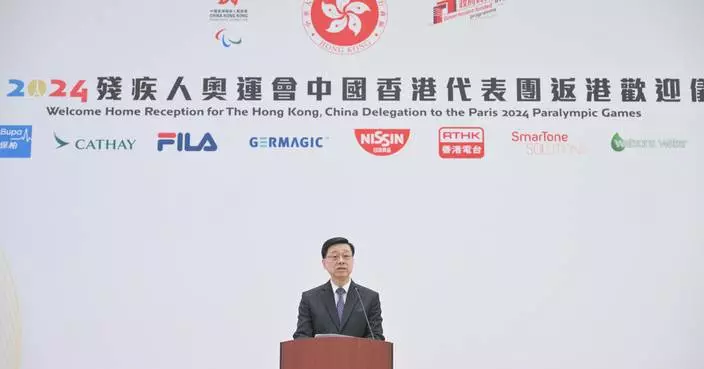Thirty-eight bone marrow donors praised for selfless contributions
The following is issued on behalf of the Hospital Authority:
The Bone Marrow Donor Award Ceremony 2024 organised by the Hong Kong Bone Marrow Donor Registry (HKBMDR) of the Hong Kong Red Cross Blood Transfusion Service (BTS) was held today (September 7), recognising 38 dedicated bone marrow donors for their selfless contributions. The BTS calls on more citizens to join in saving lives by registering for bone marrow donation, thereby giving a new lease on life to patients.
The ceremony was officiated by the Director of Health, Dr Ronald Lam, the Chairman of the BTS Governing Committee and the Hong Kong Bone Marrow Donor Registry Governing Sub-committee, Mr Ignatius Chan, the President of Hong Kong Marrow Match Foundation, Professor Alice Chiu, and the Chief Executive of the Hospital Authority, Dr Tony Ko.
Dr Lam paid tribute to all donors for their selfless contributions on behalf of patients in his opening remarks, "Donors have demonstrated the heroic and caring act by reaching out for the patients out of compassion and providing them with renewed hope. I encourage more citizens to register for bone marrow donation, offering the blessing of recovery for patients in need."
At the ceremony, a pair of bone marrow donor-recipient met each other for the first time and shared their experience. The recipient Ms Chang, expressed her heartfelt gratitude to the donor Miss Chen, "With her kind donation, I can finally recover." Ms Chang was diagnosed as lymphoma in 2016, and the situation of the recurrent illness went on and off. Later in 2017, Ms Chang started searching for bone marrow donation in the HKBMDR, and she finally received the bone marrow from Miss Chen for transplantation in March 2018.
Miss Chen, who is a regular blood donor, registered as a bone marrow donor in her college years. She agreed to donate with no hesitation. Her kind acts definitely saved the life of Ms Chang.
The human leukocyte antigen (HLA) of donor and recipient must be highly or completely matched for a successful transplantation. "The BTS helped patients requiring unrelated transplantation search for any potentially matched donor in the database. According to statistics, the chance of finding a matching unrelated donor is about one in five to ten thousand only. The odds will be even less than one in one hundred thousand for patients who have rare HLA type," the Chief Executive and Medical Director of the BTS, Dr Lee Cheuk-kwong added. He hoped to see more young people register as bone marrow donor to increase the chance for finding a matched donor for patients.
The world's first Chinese-based unrelated bone marrow donor registry was founded in Hong Kong in 1991. As of June 2024, more than 177 000 people in Hong Kong have registered for voluntary bone marrow donation, and provided matched haematopoietic stem cells for transplantation for 1 179 local and 132 overseas patients.
Members of the public aged between 18 and 50 and in good health condition can register for bone marrow donation at any blood donor centre. The simple registration process includes completing a registration form, followed by a health screening and taking blood samples for laboratory tests. For information on bone marrow donation, please call 2710 1206 or visit the website at www.ha.org.hk/rcbts.
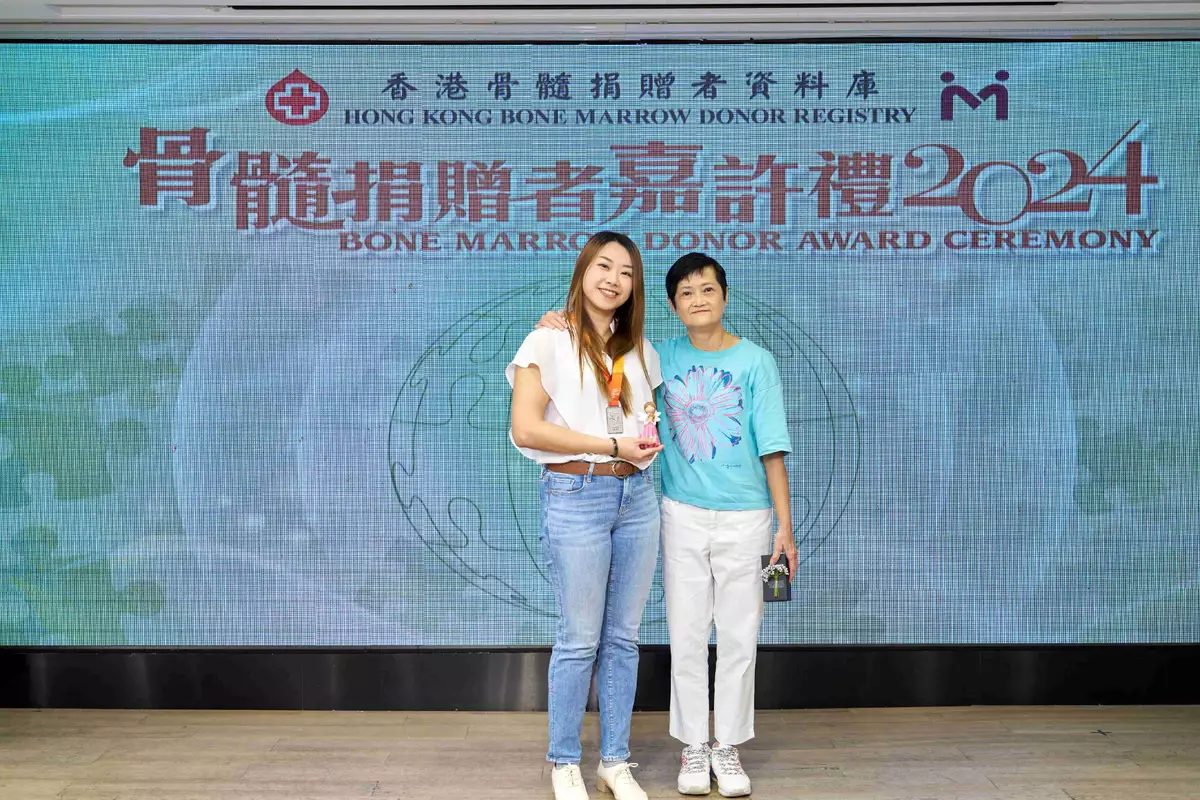
Thirty-eight bone marrow donors praised for selfless contributions Source: HKSAR Government Press Releases
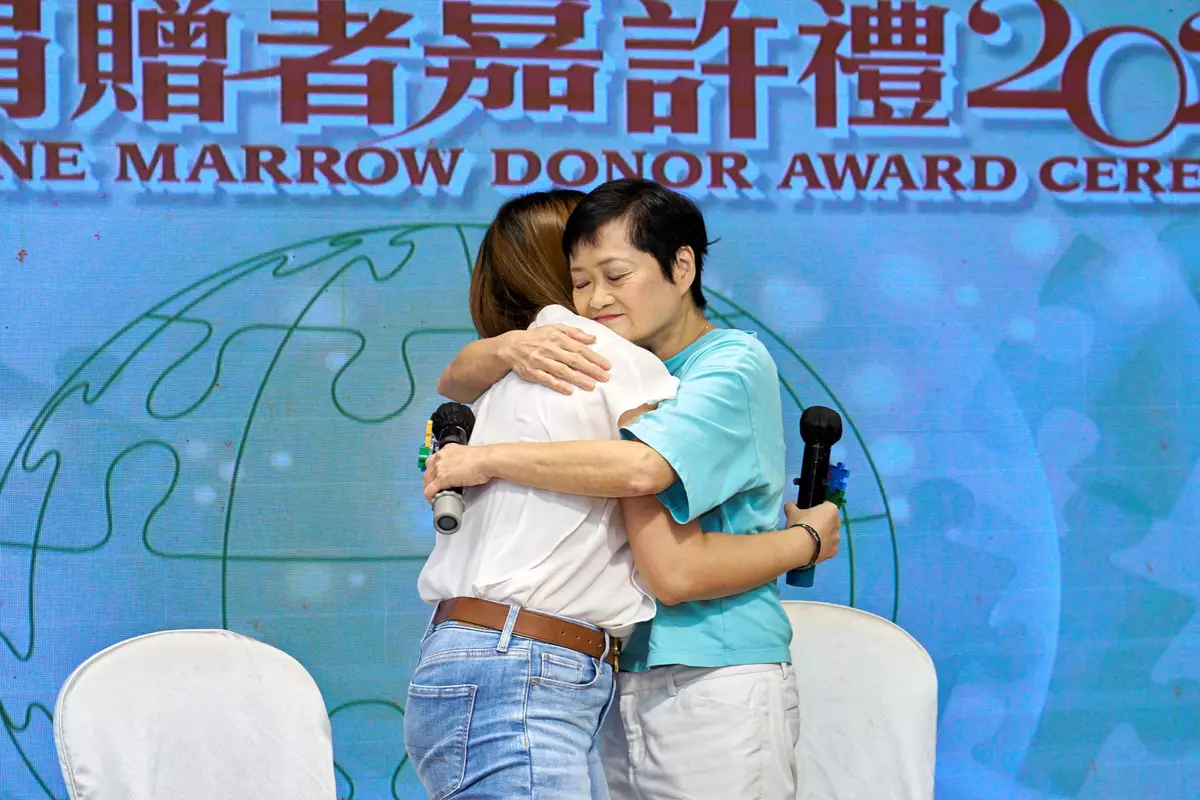
Thirty-eight bone marrow donors praised for selfless contributions Source: HKSAR Government Press Releases
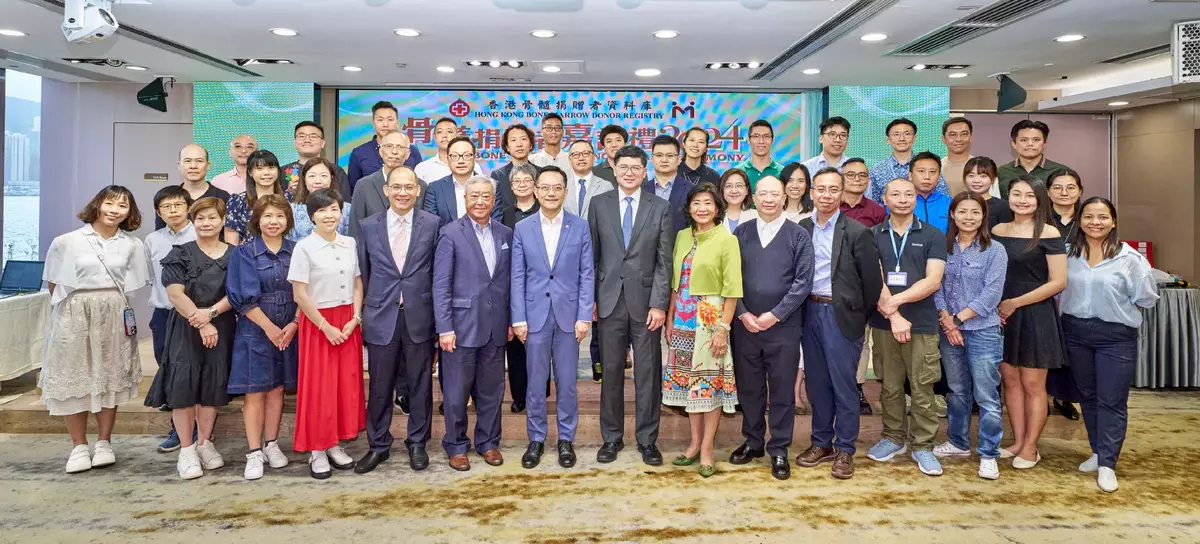
Thirty-eight bone marrow donors praised for selfless contributions Source: HKSAR Government Press Releases
CHP updates on latest situation of invasive Group B Streptococcus infection
The Centre for Health Protection (CHP) of the Department of Health today (September 16) continued its investigation into the latest situation of invasive Group B Streptococcus infection. The CHP appealed to members of the public for heightened vigilance and in particular, to pay attention when touching or handling raw freshwater fish and should wear gloves, as well as not to consume undercooked freshwater fish.
The CHP has been monitoring with the Hospital Authority (HA) the admission figures in relation to invasive Group B Streptococcus infection cases. Since the announcement of the situation of Group B Streptococcus infection belonged to serotype III sequence type 283 (ST283) on September 13, the CHP has today confirmed 13 additional ST283 cases involving patients recently admitted with invasive Group B Streptococcus infection. The CHP's epidemiological investigations showed that the 13 patients with ST283 infections involved seven males and six females, aged between 35 and 94. The patients mainly presented with sepsis (eight patients) and joint abscess (five patients). Together with the 27 cases of ST283 infection announced on September 13, this cluster involved a cumulative total of 40 patients residing in 18 districts throughout the territory. Their onset date of the disease were between August 8 and September 5, and 30 of them have underlying illnesses. The HA's information showed that among the 40 patients, 10 have been discharged, 25 hospitalised patients are in stable condition, three in serious condition and the other two with underlying illness passed away.
The CHP's analysis of samples of other recently admittedpatients is still in progress and it cannot rule out that the number of cases will further increase.
The CHP's epidemiological investigations revealed that 31 patients have contacted with or handled raw freshwater fish before onset of symptoms (five of them reported that they had wounds on their hands when handling raw freshwater fish), six patients cannot rule out that they have consumed undercooked freshwater fish (not freshwater fish sashimi), and the exposure history of the remaining three patients is under investigation.
Furthermore, none of the 40 patients were fishmongers or engaged in fish culture related jobs. As the patients resided in various districts throughout the territory, and the freshwater fishes concerned were bought from 23 markets in 11 districts respectively, the CHP considered that the affected freshwater fish may involve the wholesale level. After knowing that the genetic sequence of samples collected from a retail freshwater fish stall matched those found in some patients, the CHP immediately teamed up with the Agriculture, Fisheries and Conservation Department (AFCD) to conduct an inspection in the Freshwater Fish Market under the Cheung Sha Wan Wholesale Food Market, and collect environmental samples for testing and analysis. The laboratory analysis is still in progress. So far, no abnormality has been observed regarding the freshwater fish in the wholesale fish markets. Besides, the CHP and the Food and Environmental Hygiene Department (FEHD) have conducted medical surveillance on over 200 workers and no symptomatic worker identified. The FEHD have strengthened the cleansing and disinfection of the relevant markets.
The CHP has issued a letter to doctors to enhance their alertness for Group B Streptococcus infection cases. The CHP's investigations, as well as prevention and control works, which include closely monitoring the admission cases, conducting genetic analysis of patients' bacterial samples, testing environmental samples, and strengthening health education to workers and the public, especially the education related to wound care and consumption of freshwater fish, are still ongoing. The AFCD will continue to monitor the health condition of freshwater fish supplied to Hong Kong and ensure that there are no abnormalities and to implement feasible measures to reduce proliferation of bacteria.
"Members of the public shall wear gloves when touching or handling raw freshwater fish. If symptoms such as inflamed wound and fever develop, they should seek medical attention promptly. Meanwhile, the public should refrain from consuming undercooked freshwater fish," a spokesman for the CHP reminded.
To prevent Group B Streptococcus (ST283) infection, members of the public are reminded to maintain personal, food and environmental hygiene and should keep their hands clean and practice good wound care at all times, especially:
To minimise the infection risks, workers of aquatic products or restaurants must wear gloves when handling aquatic products and avoid direct contact with aquatic products or dirty water with bare hands;
When buying aquatic products, the public must avoid direct contact with the aquatic products or use any towel provided by the stalls. They should wash hands with liquid soap and water as soon as possible if having contact with aquatic products which are not fully cooked. When handling aquatic products at home, the public should also wear gloves and wash hands thoroughly afterwards;
Members of the public must not eat any freshwater fish sashimi, raw or undercooked freshwater aquatic products. When consuming hot pot food or congee items which consist of aquatic products, they should ensure that the food is thoroughly cooked in which the centre of the food should reach a temperature of at least 75 degrees Celsius so as to destroy pathogen; and
People must not touch aquatic products directly whenever there is a wound on hands. If a wound is sustained during handling aquatic products, the wound must be cleaned immediately and properly covered with waterproof adhesive dressings. Individuals should seek medical advice promptly when wound infection is found.
The public may visit the CHP'sInvasive Group B Streptococcus Infection associated with Sequence Type 283 (ST283)page for more information.
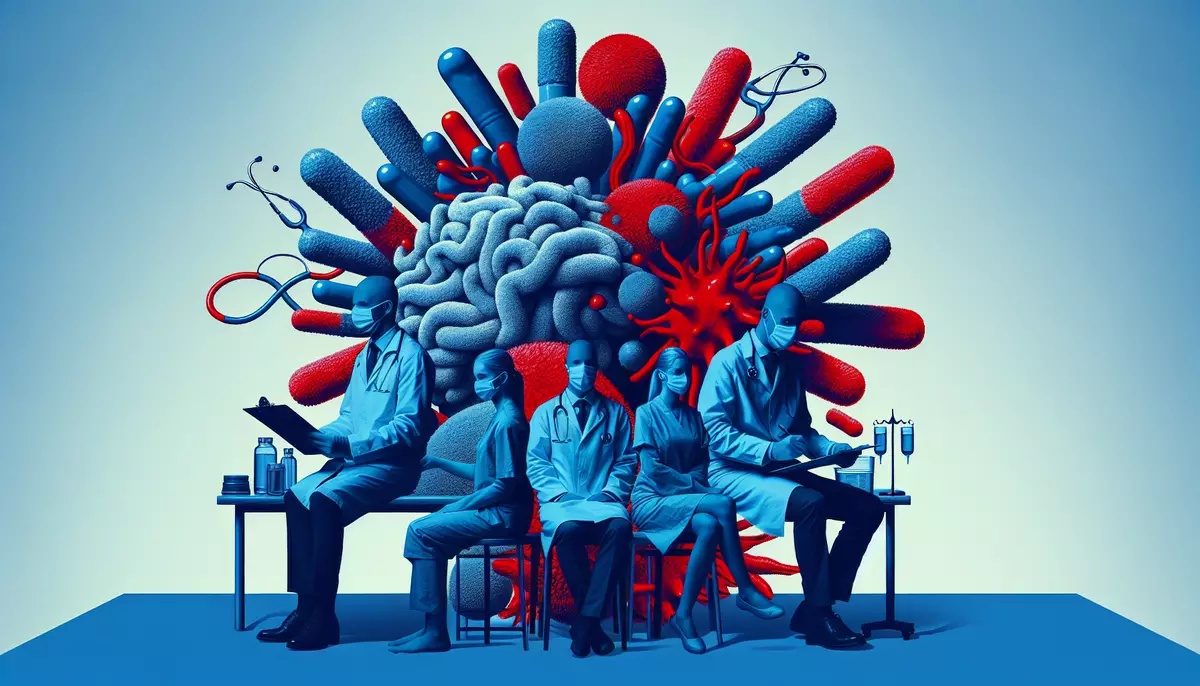
Source: AI-generated images







